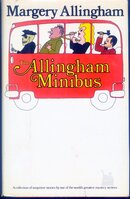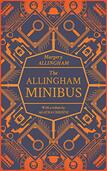
There are many more successes than misfires here, although I found myself wishing that the organization of the stories and their order were a bit less haphazard. Personally, I would have curated these pieces so they were grouped by general subject into categories such as "The Humans", "The Spirits", and "The Criminous", understanding that Allingham's characters can move between these labels with admirable ease.
It is the tales of ghosts and avenging spirits, however, that I found more resonant than the traditional crime stories. "The Sexton's Wife" is particularly good, a simple but effective tale of an old woman relating the details of a tragic triangle and beyond-the-grave revenge that occurred when she was a youthful bride. With the other supernatural stories here, atmosphere and mood are always solid, but the plots occasionally slip into cliché that allows the reader to get ahead of the simple story, as with "The Secret" and "'Tis Not Hereafter".
The author is arguably at her best with the stories that focus on the vulnerabilities of everyday people; these short pieces take an observational, reflective approach similar to de Maupassant, and some don't even feature a traditional crime element. "The Correspondents" follows a man who must reconcile his effusive friend's written adventures with a far different reality, while in "The Pioneers", a couple about to dissolve their marriage finds their perspective forced by visiting friends. And "Publicity" is a likeable underdog story about an actor who is prematurely pronounced dead and, because of this, discovers a new life with realigned values. All of these "Human" stories I found thoughtful and often elegiac.
I need to voice one criticism, as Agora seems to have chosen to alter a tale for the sake of political correctness, with no mention made that the text has been censored. The change made to a story about a celebrated Asian academic and a manor-house jewel robbery is no minor one: the final paragraph (containing the "twist" that explains the thief's ideology) is omitted, and without it the story ends abruptly and rather pointlessly. That original final-sentence sting helps to define the casual cultural racism ingrained in the Anglo-Saxon hosts, which gives an uneasy justification to the person taking their possessions and makes the story's moral landing more stubbornly ambiguous. If you are wondering what social comment that original paragraph contained, look to the story's title for your clue: "The Same to Us".

 RSS Feed
RSS Feed